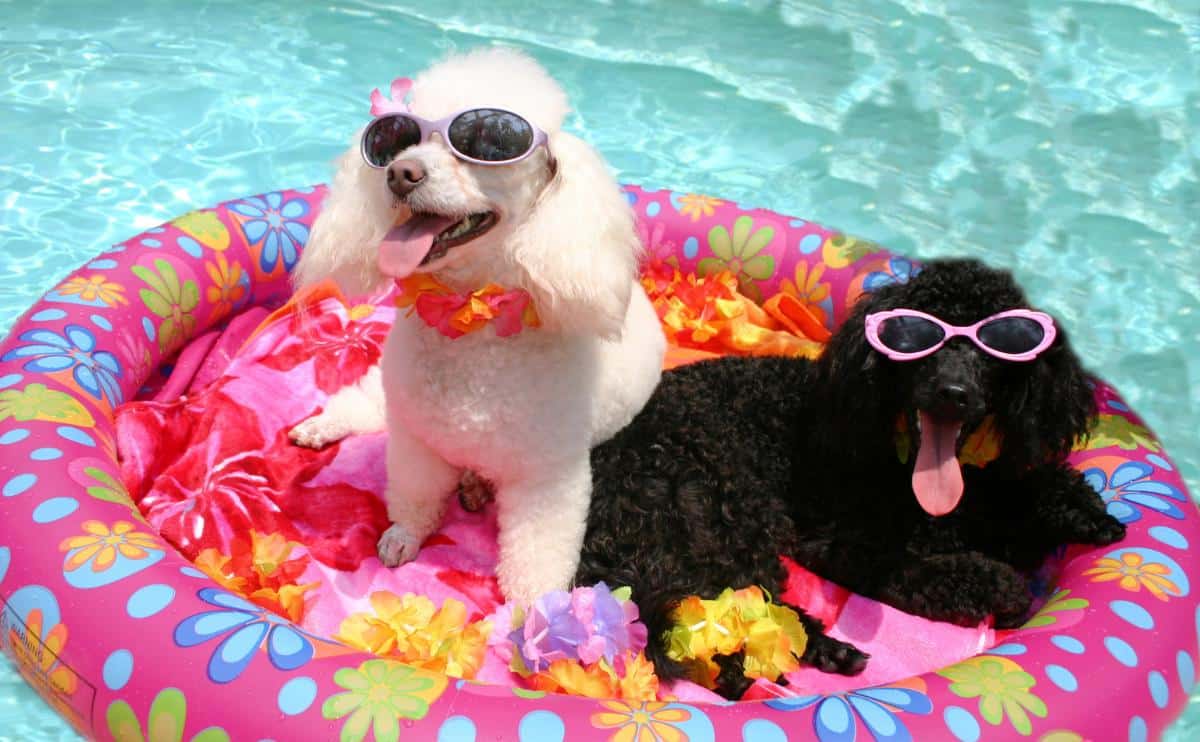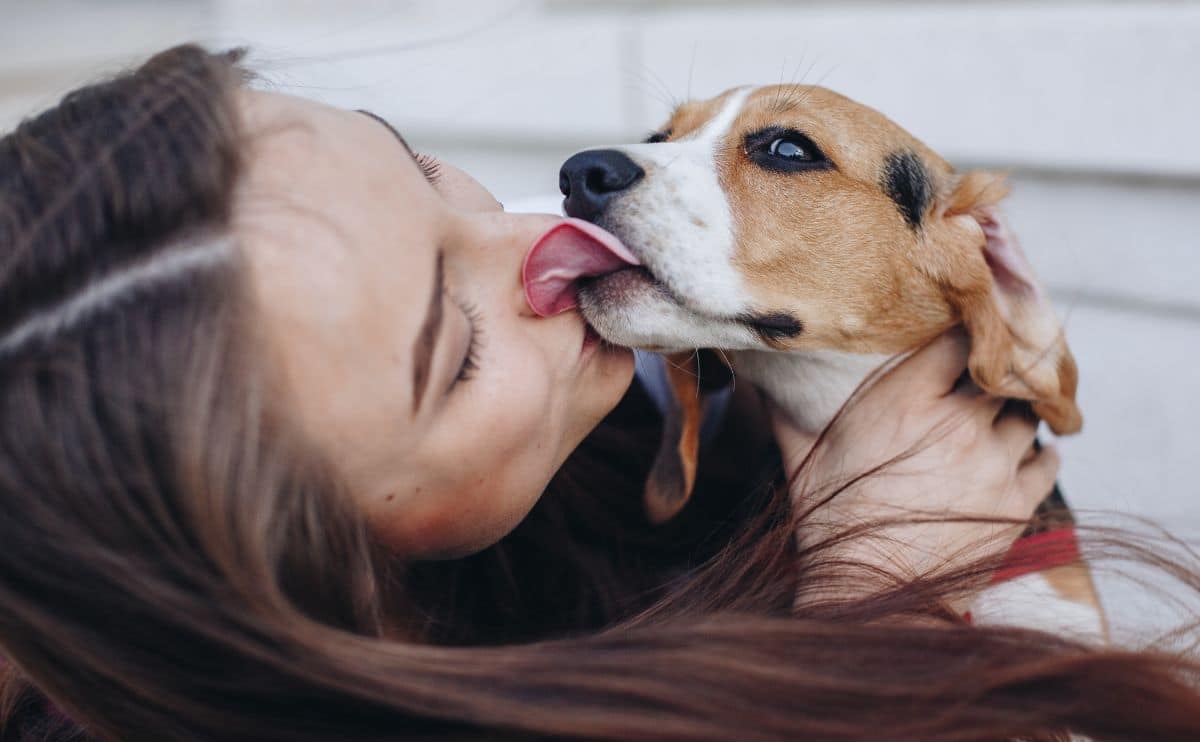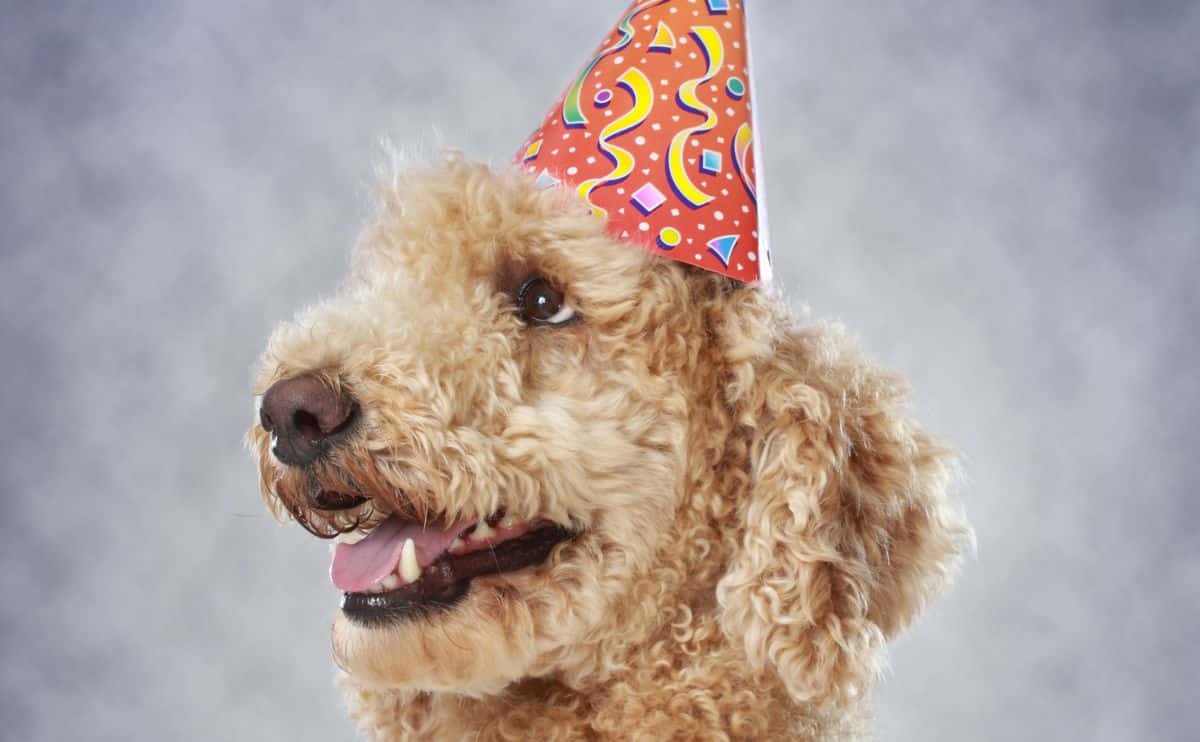The Ultimate Dog-Friendly Valentine’s Day Guide: 12 Ways To Celebrate Safely
When you purchase through links on our site, we may earn a commission. Here’s how it works.

Valentine’s Day is all about love, and for many of us, that includes our four-legged best friends. You want to make the day special for your pup, but before you reach for those traditional Valentine’s Day gifts, there’s something important you need to know. Some of the most common holiday treats and decorations could be more dangerous than you think—and they might be lurking in your plans without you even realizing it.
Table of Contents
From sweet treats to beautiful bouquets, certain festive staples that seem harmless can actually put your dog at risk. Even well-intentioned gifts and gestures could lead to an unexpected trip to the vet if you’re not careful. But don’t worry—there are plenty of ways to celebrate that will keep your pup safe while making the day extra special.
So, how can you make sure your dog feels loved without the risks? There are creative, fun, and completely safe ways to include them in the celebration—ways that will bring you closer and make the day unforgettable. Keep reading to find out exactly how to give your dog the best Valentine’s Day ever.
1. Never Let Your Animals Eat Chocolate

Chocolate has been a symbol of love and indulgence for centuries, but its connection to Valentine’s Day became especially popular in the 19th century. The tradition largely traces back to Richard Cadbury, a British chocolatier who capitalized on the romantic holiday by producing beautifully decorated boxes of chocolates in the 1860s. Since then, gifting chocolate has become one of the most common Valentine’s Day traditions, symbolizing sweetness, luxury, and affection. Whether in the form of heart-shaped truffles or decadent assortments, chocolate remains a go-to gift for expressing love.
But while it’s a treat for humans, chocolate is anything but sweet for dogs. The main culprit is theobromine, a stimulant found in cocoa that dogs cannot metabolize efficiently. Even small amounts can lead to symptoms like restlessness, increased heart rate, vomiting, and, in severe cases, seizures or fatal poisoning. Dark chocolate and baking chocolate contain even higher concentrations of theobromine, making them particularly dangerous. And it’s not just the chocolate itself—many Valentine’s Day sweets also contain xylitol, an artificial sweetener that can cause a rapid drop in a dog’s blood sugar, leading to life-threatening complications.
Trupanion Pet Insurance reports that, historically, chocolate makes up 70% of toxicity-related claims around Valentine’s Day.
A ten-pound dog can come away with vomiting, diarrhea, hyperactivity, seizures, and an abnormally elevated heart rate from just two ounces of baking chocolate or 20 ounces of milk chocolate. Chocolates also contain fat and caffeine-like substances known as methylxanthines, which can cause the above symptoms and death in severe cases.
Cats are sensitive, too, but they don’t usually eat large enough amounts of chocolate to cause anything worse than gastrointestinal upset.
So, while chocolate may be a classic Valentine’s Day gift for your human loved ones, it’s one tradition you’ll want to keep far away from your pup. If you’re looking for a special treat to share with your dog, there are plenty of safe, dog-friendly alternatives (including these Valentine dog bone treats) that will let them feel just as spoiled—without the risk. Learn what to do if your dog does get a hold of chocolate.
2. Put Bubbly & Alcoholic Beverages Out Of Reach

Valentine’s Day celebrations often include a toast to love—whether it’s with a glass of wine, champagne, or a carefully crafted cocktail. While sharing a drink with a romantic partner is a staple of the holiday, it’s important to remember that alcohol and dogs are a dangerous mix. Even a small amount of alcohol can be harmful to your pup, leading to serious health issues that can quickly turn a joyful evening into an emergency situation.
Dogs process alcohol very differently than humans, and their smaller bodies make them far more sensitive to its effects. Even a small sip of wine or beer—or accidental exposure to a spilled cocktail—can cause symptoms like dizziness, vomiting, difficulty breathing, or even seizures. In more severe cases, alcohol poisoning can lead to a dangerous drop in blood sugar, body temperature, and heart rate, which could become life-threatening. Certain drinks, especially sweet or fruity cocktails, are even riskier because they often contain toxic ingredients like xylitol, artificial flavorings, or high-proof liquors that are especially dangerous for pets.
Alcohol exposure doesn’t just come from drinks, either. Foods prepared with alcohol—like boozy desserts, rum-soaked cakes, or sauces made with wine—can also pose a risk to your dog. That’s why it’s crucial to keep all alcoholic beverages and alcohol-infused foods far out of reach. If you’re looking to include your pup in the celebration, opt for pet-safe alternatives, such as dog-friendly treats or even a special non-alcoholic “dog beer” made from safe ingredients. This way, you can both enjoy the holiday together—without any risks. Learn about some dog-friendly beverage options.
3. Don’t Let Them Eat Xylitol Or Other Sugar Substitutes

Candy is one of the most popular Valentine’s Day gifts, with heart-shaped boxes and colorful sweets filling store shelves every February. Whether it’s classic conversation hearts, chocolate truffles, or gourmet caramel treats, sugary confections are a staple of the holiday. But while these sweet indulgences make great gifts for humans, they can be incredibly dangerous for dogs. Many common Valentine’s Day candies contain ingredients that are toxic to pets, making it crucial to keep them out of reach.
One of the biggest dangers comes from xylitol, an artificial sweetener found in sugar-free gums, mints, and many low-sugar candies. Xylitol is extremely toxic to dogs, even in small amounts, as it can cause a rapid drop in blood sugar and lead to seizures, liver failure, or worse. Chocolate-based candies, as previously mentioned, also pose a serious risk due to theobromine, which dogs cannot metabolize properly. Even seemingly harmless treats like caramel, hard candies, or gummies can cause stomach upset, choking hazards, or digestive blockages—especially if they’re wrapped in foil or plastic that a curious pup might swallow.
“If you suspect your dog may have eaten products containing any of these harmful ingredients, please seek veterinary treatment immediately,” says Dr. Steven Hansen, veterinary toxicologist and Vice President of the ASPCA Animal Poison Control Center.
To keep your dog safe, be sure to store all Valentine’s Day sweets in a secure place where they can’t sneak a taste.
4. Place Flowers Out Of Reach

Many varieties of lilies are highly toxic to cats, so if these are your Valentine’s flower of choice, make sure your cats can’t get near them. Lily toxicity is one of Trupanion’s most common (and one of the most expensive) toxicity claims, with an average claim cost of nearly $800.
Other potentially poisonous flowers may include:
- Tulips (especially if potted, as the bulbs are the most toxic)
- Amaryllis (same as tulips)
- Calla Lily (can cause intense oral and gastrointestinal irritation)
- Daisies
- Chrysanthemums
- Baby’s Breath
Safer floral alternatives might include:
- African violet
- Asters
- Camellia
- Canna Lilies (they are not of the genus Lilium)
- Jasmine
- Orchids
Check out our toxic plant list to ensure that your choice of flower or plant is a safe one. Much of this vital information pertains to birds, dogs, and cats.
5. Keep Pets Away From Thorns Too

We urge pet owners to be cautious with roses and other flowers containing thorns as they are potentially harmful if played with, bitten, stepped on or swallowed.
“It’s all too easy for pets to step on thorny stems that fall to the ground as a flower arrangement is being created,” says Dr. Louise Murray, Director of Medicine for the ASPCA’s Bergh Memorial Animal Hospital. “Be sure to keep your pets clear of your workspace as you arrange your beautiful flowers since they can develop serious infections from thorn punctures.”
6. Don’t Leave Candles Burning

Candles are a classic part of setting a romantic Valentine’s Day atmosphere, casting a warm glow over a dinner table, or filling the room with soothing scents. While they can enhance the mood for the holiday, they also pose a hidden danger when pets are in the home. Dogs, especially those who are curious or energetic, can easily knock over a candle, leading to potential burns, fire hazards, or exposure to harmful chemicals found in scented varieties.
An open flame is always a risk with pets around, particularly if your dog is prone to wagging their tail near surfaces, jumping onto furniture, or investigating new objects with their nose. A single misplaced step or excited movement can send a lit candle tumbling, increasing the risk of accidental fires or injuries. Even if a candle remains upright, an unattended flame can lead to singed fur, burned paws, or worse if a dog gets too close out of curiosity.
Scented candles add another layer of concern. Many fragrances, especially those made with essential oils like eucalyptus, tea tree, or citrus, can be irritating or even toxic to dogs when inhaled over time. To keep your pup safe while still enjoying a cozy Valentine’s Day ambiance, consider using flameless LED candles instead. They provide the same soft glow without the risks of fire or burns. If you prefer traditional candles, be sure to place them out of reach, never leave them unattended, and opt for pet-safe, non-toxic options.
7. Clean Up Gift Wrap And Decorations

Heart-shaped garlands, balloons, ribbons, and flowers fill homes with a romantic atmosphere. While these decorations help set the mood, they can pose unexpected dangers to dogs if not used with caution. Curious pups may see them as new toys, leading to choking hazards, digestive blockages, or even toxic exposure.
Balloons are one of the biggest risks. If a dog bites or pops a balloon, the latex or Mylar pieces can become a serious choking hazard or cause an intestinal blockage if swallowed. Ribbons, streamers, and decorative bows can also be problematic, especially for dogs who love to chew. Long, string-like decorations can be extremely dangerous if ingested, as they can cause internal damage and require emergency surgery to remove.
To keep your dog safe while still enjoying festive décor, opt for pet-friendly alternatives. Keep balloons and ribbons out of reach, and secure decorations to prevent chewing. By being mindful of your décor choices, you can create a beautiful Valentine’s Day setting without putting your furry friend at risk.
5 Fun & Safe Ways to Celebrate Valentine’s Day With Your Dog

Valentine’s Day isn’t just for romantic partners—it’s the perfect time to show love to your loyal, four-legged best friend! While traditional gifts like chocolate and roses are off-limits for dogs, there are plenty of fun and creative ways to make the day extra special for your pup. From adorable outfits to delicious treats, here’s how you can celebrate Valentine’s Day with your dog in a way they’ll truly enjoy.
1. Dress Up For The Occasion
What’s cuter than a dog in a Valentine’s Day outfit? Dressing your pup in a festive costume or accessory can make the holiday extra fun. Look for pet-safe, comfortable options like:
- Heart-themed bandanas – A simple yet stylish way to give your dog a festive look.
- Valentine’s sweaters – Perfect for chilly February weather, a cozy sweater with hearts or love-themed designs keeps your pup warm and adorable.
- Cupid wings or bow ties – If your dog tolerates accessories, a set of angel wings or a heart-covered bow tie makes for the cutest photo op!
Make sure whatever you choose is comfortable and non-restrictive, so your pup can move freely and enjoy the day.
2. Plan A Special Valentine’s Date
Instead of a fancy dinner for two, why not have a fun outing with your furry Valentine? A few ideas include:
- Dog-friendly café visit – Many coffee shops offer puppuccinos or special dog-friendly treats.
- Scenic nature walk – Take your pup on a long, adventurous walk at their favorite park or nature trail.
- Paw-print painting session – Create a keepsake by dipping your dog’s paw in pet-safe, non-toxic paint and pressing it onto a canvas for a cute Valentine’s Day memento.
3. Spoil Them With Dog-Friendly Valentine’s Treats
Since chocolate is off-limits, treat your pup to something special they can enjoy. You can buy or make dog-friendly treats, such as:
- Heart-shaped biscuits – Many pet bakeries sell Valentine’s Day-themed dog treats, or you can make your own using peanut butter, oat flour, and pumpkin.
- Frozen yogurt & fruit treats – Blend plain yogurt with strawberries or bananas, freeze in heart-shaped molds, and serve for a healthy, festive snack. Here are some frozen dog treat recipes.
4. Give Your Dog A Valentine’s Day Gift
Spoil your pup with a special Valentine’s gift that they’ll love. Some great options include:
- Plush heart-shaped dog toys – Many brands sell Valentine’s-themed plush toys with squeakers for playful pups.
- Interactive puzzle toys – Keep your dog entertained with a puzzle toy that dispenses treats when they figure it out.
- Personalized pet tags or collars – Get a custom-engraved heart-shaped tag or a festive pink or red collar to make them feel extra special.
5. Have a Cozy Movie Night Together
Nothing says love like quality time, so cuddle up with your pup for a dog-friendly movie night. Pick a movie featuring dogs, like Lady and the Tramp, Homeward Bound, or Bolt, and grab some popcorn for yourself and dog-friendly treats for your pup. Lay out a soft blanket, give them their favorite chew toy, and enjoy a relaxing night in together.
Valentine’s Day is about celebrating love in all forms, and who better to shower with affection than your loyal canine companion? With these fun, pet-safe ideas, you can make the day extra special for your dog and create memories that will last long after the holiday ends.
Are You Sure A Pet Is The Best Gift?
It may seem very tempting to give your loved one a new puppy or kitten for Valentine’s Day. They sure are cute and cuddly! But we wish to remind you that bringing a new companion animal into your home is a big decision. Why you should reconsider giving a dog as a gift.
Why not present your loved one with a gift certificate to adopt from your local shelter or take a trip to the shelter together? You might make another love match.



